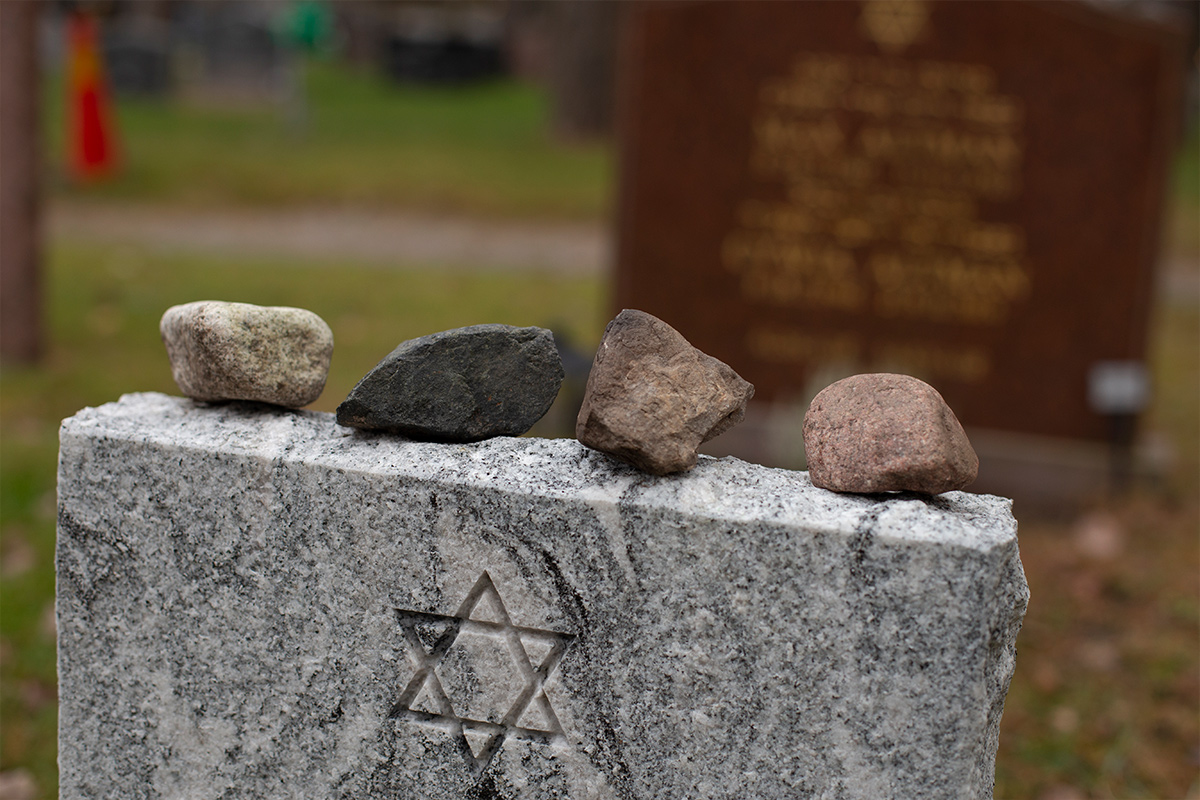Approximately once a year I go with my parents to Old Montefiore Cemetery in Queens, New York. Always in the Elul heat, I walk up to the metal gates inscribed with our family’s burial society name in Yiddish, “Chevra Adas Jacob Anshe Slabodke.” This is holy ground. My center of gravity shifts. Calmness washes over me as I begin to feel held. I’m reminded, even when my heart feels empty, every beat pounds with the raging thunder of my ancestors.
Here we are in Elul again — the last month of the Hebrew year that leads up to the High Holidays. My favorite custom to prepare for the New Year is often overlooked, but visiting the graves of loved ones during Elul is a tradition that dates back centuries. Some offer prayers for the deceased in hopes they will intercede on behalf of the living. But the observance that resonates with me most is visiting the cemetery as a way to gain perspective on my own life during this season of return, repair, and renewal.
I’ve had depression most of my life. I’ve hit the lowest of lows and at times been afraid to live. I have a chronic illness so feeling isolated is not new, but this pandemic has taken its toll. By the end of the first six months of the pandemic I had three bouts of severe suicidal ideation. Feeling the lack of community dampened my spirit so greatly, sometimes I thought it was beyond repair.
I’m also loudly queer which results in regularly being shamed by queerphobic family. I would love to say this doesn’t affect me, but that wouldn’t be the truth. It has caused tremendous hurt that only got amplified during lockdown. There was no escaping the feeling of being trapped between concrete walls made of loneliness and shame.
Then, just in time, came Elul.
Teshuva, a core value this time of year, often gets enacted as repentance. This has always felt hollow to me especially paired with tashlich, the symbolic casting off of sins, on Rosh Hashanah. I used to wonder what the point of repentance was if that’s all we do. We can’t just throw away our sins and say that everything’s fine. But repentance isn’t the only goal of teshuva. The literal translation of the word is “return” as in a return to self. It’s here I find meaning and can do the inner transformational work this season calls for.
For me, a return to self means accountability where I fell short while working to repair and heal. It also means a regrounding of mind, body, and spirit. The place I automatically want to do this work is the cemetery, and connecting to my ancestors is my point of reflection. What I’ve learned is that before I can think about the future, I need to look to the past.
Did you know if you go back five generations, it took at least 32 people to get to you? If you go back 10 it took at least 1,024. Our breath is nothing short of a miracle. Especially after seeing just how quickly it can be taken away, every breath feels more precious than the last. I’m reminded of the resilience of the 1,024+ people whose shoulders I stand on. I may not know the names of all those ancestors, but wow, that’s a lot of people to somehow result in my life.
As I meditate in the cemetery I’m drawn to my Poppy and Grandma Elaine’s stone. It has their names etched into a book. Between them is an eternal flame. I begin to imagine what they would think of me. Would they accept my queerness? Would they be proud of me as I study to become a rabbi? Would they love my rainbow hair? I know the answer to all three questions is yes, because I am living beyond their expectations of what life could be. Their ancestral flame burns within me and holding onto that makes my fire burn brighter.
Learning from the stories of those who came before me — their greatness as well as their imperfections — propels me forward.
I reflect on the present through the lens of the future knowing not only will I look back once again in a year’s time, but others will reflect on the legacy that outlives me.
What am I proud of?
Where have I found love, comfort, strength, and compassion?
What values have I led with and lived by?
In what ways can I learn and grow while there’s still time?
As I sit in the cemetery reflecting on these questions, the concrete walls start to crumble. I remember my chosen family that loves me as I am. I have an aunt and uncle that make me laugh harder than anyone else. I have older cousins who support me even when I’m too busy to visit. I have younger cousins that inspire me and will one day take on the world. Some already have. I get to support them with pride as their own flames grow stronger year after year. And I have parents that, even with rifts, view every breath I take as nothing short of a miracle.
Amidst this sea of stone I feel ancestral breath fill my chest. The strength of many has evolved into my singular being. I’m struck with the realization that there is not enough time to live any other way than boldly. There is not enough time to feel shame about any part of my identity. There’s not enough time to go back to the dark places I’ve been. I have so many blessings to live for. I recite the Shechiyanu in thanks.
My imprint on this world, as small as it might be, has already begun to take shape.



